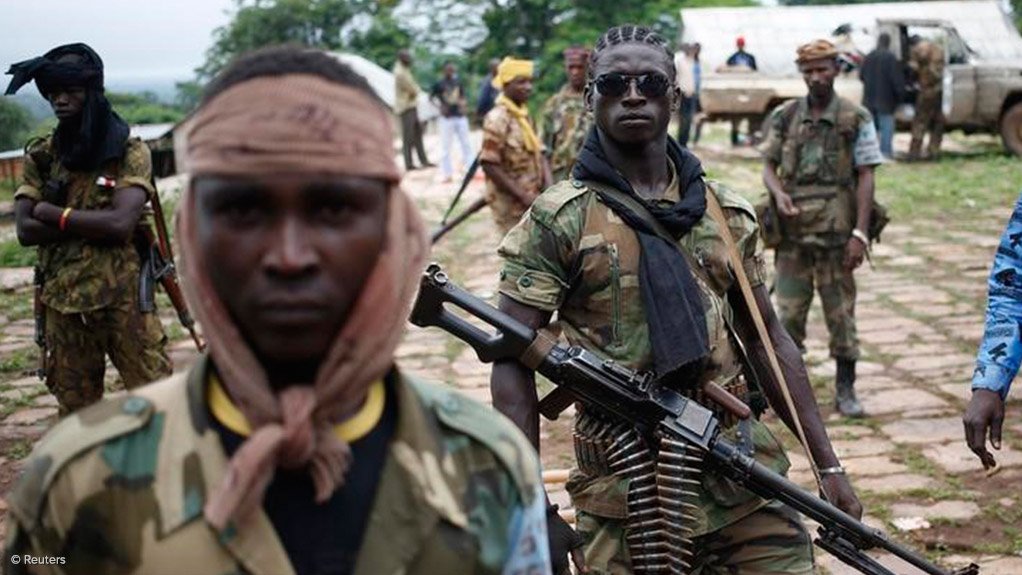The government of the Central African Republic (CAR) has signed an "immediate ceasefire" deal with rebel groups at a meeting in Italy's capital, Rome, aimed at ending violence in the strife-torn country.
Under Monday's accord, armed groups will be given representation in the political arena in exchange for an end to attacks and blockades, and their members will be brought into the country's armed forces.
"We commit to the immediate implementation by political-military groups of a country-wide ceasefire, to be monitored by the international community, as a fundamental step on the way to definitive peace," the deal read.
"The government undertakes to ensure military groups are represented at all levels" and are "recognised as part of the reconstruction efforts", it said.
The rebel groups pledged to ensure "the free movement of people and goods by removing illegal barriers as an immediate consequence of the ceasefire".
The accord was mediated by the Roman Catholic Sant Egidio peace group, and calls for an immediate end to hostilities and the recognition of legitimate authorities following the last elections.
The country, one of the poorest in the world, has been plagued by inter-religious and inter-communal conflict since 2013 between the mainly Muslim Seleka rebels and the Christian Anti-Balaka militia that started after the overthrow of leader Francois Bozize.
History of instability
UN Secretary General Antonio Guterres voiced concern this month over the "widespread instability" and attacks on UN troops in the CAR, after a month of renewed violence which forced tens of thousands to flee conflict-ravaged areas.
In May this year, the UN's refugee agency said that there were more than 500 000 internally displaced persons in the country.
In fact, CAR has enjoyed little stability since gaining its independence from France in 1960.
Five years later President David Dacko was overthrown by Jean-Bedel Bokassa, who took charge in January 1966 and crowned himself emperor in 1977 in a wildly extravagant ceremony that made waves around the world.
The French drove Bokassa out on September 20, 1979, while he was on a visit to Libya . Dacko was reinstated, but two years later forced to hand power over to senior military officers.
A multi-party system was unveiled in 1991, but then three mutinies in 1996-97 were followed by a failed coup in 2001.
Bozize, a former military chief, rebelled and took over in 2003. Several more rebellions followed and France intervened with help from Chadian soldiers in November 2006 to recapture towns in the north that had fallen to rebel forces.
Bozize was re-elected in 2011, though the vote was marred by fraud; he was overthrown in March 2013 by mostly Muslim rebels from the Seleka coalition, who were in turn overthrown a year later by a military intervention led by the former colonial ruler.
Those events sparked the bloodiest sectarian violence in the country's history as mainly Christian militias sought revenge against their Muslim rivals. Poverty
The CAR is rich in natural resources, including diamonds, uranium, timber, gold and oil.
However, the chronic crises have greatly harmed key sectors, and economic activity now comprises mainly subsistence agriculture.
Almost 70 percent of the country's 4.8-million inhabitants live in poverty, and in 2015 the World Bank estimated per capita income at $330, making it one of the world's poorest countries.
Administrations have been paralysed by the unrest, and the customs, tax and public treasury services are unable to collect funds needed to pay salaries and pensions.
Gross domestic product plunged by 36 percent amid the unrest in 2013 but managed to expand by a slight one percent in 2014.
In March, the country came in last of 155 nations surveyed in the annual World Happiness Report.
However, an International Monetary Fund report last month projected economic growth at 4.7 percent "assuming the ongoing dialogue with armed groups helps to reduce violence and public and private investment rebound".
EMAIL THIS ARTICLE SAVE THIS ARTICLE
To subscribe email subscriptions@creamermedia.co.za or click here
To advertise email advertising@creamermedia.co.za or click here











